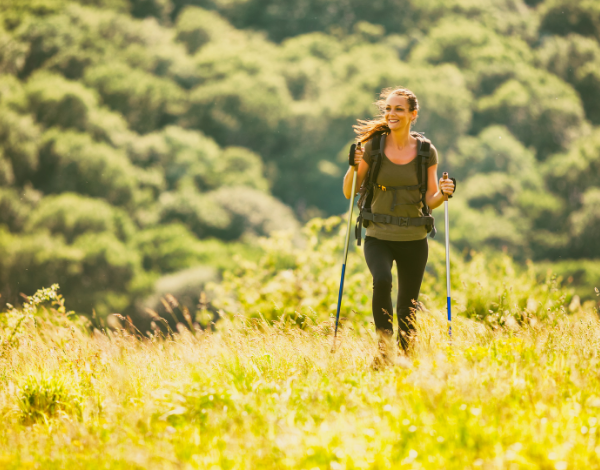Will hiking help me lose weight? You bet! We break down the top health benefits of hiking and offer a few tips on the best hikes for weight loss. Plus, use our hiking calculator to measure your results.
Hiking is about enjoying the great outdoors. But there are health benefits attached to hiking. Weight loss is one of them. No, hiking is not the quickest way to get fit, but it might just be the most fun way to get in shape.
In this article we talk about the surprising benefits of hiking, plus show you how to maximize your hiking experience to lose a few pounds in the process.
This post contains some affiliate links to products that I use and love. If you click through and make a purchase, I’ll earn a commission, at no additional cost to you. Read my full disclosure here.
In This Article
3 Surprising Health Benefits of Hiking
There are many benefits associated with hiking. It’s good for your mental health, as well as your physical well-being.
Here are three benefits you may not have considered.
Benefit #1: Helps Offset Chronic Disease
Sure, hiking is good for the heart, but most people fail to realize it can actually fight and even reverse some chronic conditions..
The American Hiking Society reports physical activity (hiking) reduces the risk of heart disease and can reverse the course of other chronic diseases, like diabetes, hypertension, arthritis, and osteoporosis.
Hiking is even linked to the offset of cognitive diseases like Alzheimer’s and dementia.
This video by Alpenwild explains why walking outdoors is beneficial in reducing the risk of these cognitive diseases.
Benefit #2: Enhances Your Mood
You might not need that $100 an hour counselor. A walk in the woods could give you more value (just kidding, don’t stop your therapy).
Seriously, studies show getting exercise outdoors reduces stress and enhances your mood.
A number of small studies hint that spending time in green space—nature preserves, woodlands, and even urban parks—may ease people’s stress levels.
Harvard Health
It even has its own term: Ecotherapy. Some call it ‘green exercise.’ It’s merging the great outdoors with mental health. And it works.
English scientists determined that just five minutes of green exercise—physical exercise in a natural environment—improves mood and self-esteem.
University of the Cumberlands
Gives a whole new meaning to the term, ‘Go take a hike!’
Benefit #3: Burns Fuel to Help You Lose Weight
Our bodies are like engines. Anytime we move we burn fuel. Different activities burn different fuels.
According to Dr. Annette Bosworth, the basic breakdown of our fuel sources goes like this: Our bodies can burn carbohydrates, proteins or fat.
In this video, she uses the analogy of a campfire that burns three types of wood. Note, this talk is in the context of the keto diet, but the lessons are clear about our fuel sources.
In a nutshell: Fat is the optimal fuel source.
Carbs burn fast. You typically burn more carbs during a high-intensity workout.
Proteins burn slower than carbs, but faster than fat.
Fats burn slower. You’ll burn more fat during a long hike than you will carbs.
I like to use the analogy of a candle vs a match. A match will burn hot for a short amount of time. A candle burns slow.
Which is better for weight loss? If your goal is only to lose weight fast, consider a high-intensity workout. You will burn through carbs quickly.
If, however, you want a longer-lasting (burn fat) regimen to lose weight, hiking could be a perfect fit. Many trainers suggest walking is a better source of burning fat than other activities.
How Many Calories Can You Burn Hiking?
There is no simple answer to this (although we will give you an easy way to calculate below.
The Mayo Clinic summarizes the key factors determining weight loss this way:
- Body size and composition. People who are larger or have more muscle burn more calories, even at rest.
- Your sex. Men typically burn more calories than women.
- Your age. As you age, you generally have more fat than muscle which decreases how fast you burn calories.
- Thermogenesis. That’s a fancy word for how you process food. According to their report, about 10 percent of calories are used during digestion.
- Mobility. How active you are plays a big role in how your body burns fuel., The more active you are in daily life, the easier it is to amp up the calorie burn.
As you can see, there are a lot of factors that determine how much weight you can lose while hiking.
To keep it simple (and manageable), use the calculator below to determine your potential weight loss while hiking.
Hiking Weight Loss Calculator
Here is a handy hiking calculator. Bookmark this page so you can come back later.
To use the calculator, fill in the information beside the required field. It will automatically calculate your results.
Best Hikes For Weight Loss
The benefit you get out of a hike is determined by what you put into it. To get more out, you have to add more strenuous activity.
There are several factors to consider will you plan your hike, especially if you want to drop a few pounds.
Terrain
Is the terrain steep? How about the path, uneven? The tougher the hike, the more calories you will burn.
When we lived in Colorado, Garden of the Gods Park was our backyard. There are tons of hiking paths in the park. Some are even paved paths. Others require more effort.
We burned more calories hiking the tough trails than meandering along the paved walkways.
I know this should be obvious, but don’t overlook the difficulty of the path when you consider how much weight you will lose.
Elevation
This is a factor I didn’t consider until living in Colorado. We lived at 6500 feet. We often hiked at 9,000 feet or above. From our experience, we burned more calories at higher elevations.
This may be a small factor, but it’s one I consider when hiking. Read this article for an interesting take on this.
We often joke, ‘the higher you go, the lower your weight!’ Is it true? Who knows. But it keeps us climging.
Distance
I’ll include time in this as well. The further you hike (thus, the longer), you will expend more energy and burn more fuel.
The average person walks one mile in 20 minutes (hikers are usually faster than average). That’s 3 miles an hour. If we bump it up to 4 miles an hour, the average person burns between 135 and 200 calories during a typical walk.
Hiking will burn more calories. Use the calculator above to get a better measure.

These figures were taken from Harvard Health. And remember, this is based on 30 minutes of movement.
My point is distance (how far you hike) is a big determining factor in calorie burn. The longer the hike, the better the results.
Strain
This is usually measured by how much weight you are carrying in your backpack.
Tip: If you add one gallon of water to your backpack, adds close to eight pounds, which can increase how fast you burn calories up to 14 percent.
Below we have a few more tips on how to get the most out of your hike if you want to drop a few pounds.
Metabolism
Your body type and metabolic rate is a big factor in how much weight you can lose while hiking.
We can break it down even further: Body size, sex, and age are also important factors to consider.
Review the May Clinic information above to get a better picture of how this affects your weight loss.
Two things to remember:
1) Don’t measure yourself by others.
Weight loss varies between individuals. We get tripped up when we expect the same results as someone else. Measure your success against yourself.
2) Don’t get discouraged if you do not get the results they get.
If you keep at it, you will drop weight by hiking.
Tips on How To Get The Most Out Of Your Hike
Along with these tips we include tools and products to help you get the most out of your hike to lose weight.
1. Use the right shoes
Comfort is important if you plan on hitting the mountains. Make sure you have the right shoes so you do not hurt your feet.
When we moved to Colorado and starting hiking in the mountains there (compared to back East), I realized I didn’t have the right shoes. Mine were uncomfortable for the rocks. They were also very old. So I bought a pair of Murrell’s that worked for me.
2. Carry extra weights to squeeze out more benefit
This is tricky. There is a delicate balance to the right amount of weight that doesn’t affect your posture or cause back or shoulder injuries.
I’ve seen hikers have ankle weights or wrist weights to get that extra burn. My recommendation is to talk to your doctor to see if this is something that would benefit you.
If you do add weight, go with moderation.
3. Use a Hiking Pole
The Journal of Strength and Conditioning discussed several benefits of hiking with a trekking pole.
Trekking poles have been used by hikers for a variety of putative benefits, including increased stability, decreased muscular strain on the lower extremities, increased climbing potential during rugged hikes, and aid for orthopedic problems. More recently, fitness practitioners have suggested using poles to increase arm activity and caloric expenditure during walking.
While the study is inconclusive on how beneficial poles are to weight loss, it appears that the advantages are enough to make it worthwhile.
Trekking Pole Recommendations
4. Carry (and drink) lots of water
Don’t underestimate your need for hydration during your hike.
Water is necessary, not only to keep your ‘steam engine running’ but it also flushes toxins from your system.
Most trainers recommend drinking a liter (roughly one quart) of water every hour. Just don’t drink it all at once. Stop every 15 minutes or so to hydrate.
SHOP MORE HYDRATION PACKS HERE
5. Use a Fitness Tracker
One other cool trick is to use a fitness watch to track your progress and calorie burn. This keeps it simple and you get your results in realtime.
Fitness trackers can monitor your heartrate, count your steps, and let you know how many calories you’ve burned. Oh yeah, they tell time too!
SHOP MORE FITNESS TRACKERS HERE
Will Hiking Help Me Lose Weight Final Thoughts
Hiking may not be the best exercise to lose weight, but the benefits go far beyond simply dropping a few pounds. The overall health advantages make hiking something to consider for your exercise regimen.
Plus, it’s just great to get outdoors.
Cover image by Canva Pro License Photo by Getty Images Pro




We are participants in the Amazon Services LLC Associates Program, an affiliate advertising program designed to provide a means for sites to earn advertising fees by advertising and linking to Amazon.com